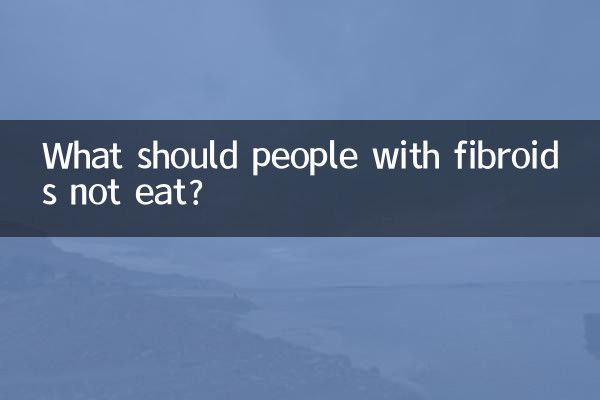What should people with fibroids not eat?
Uterine fibroids are common benign tumors in women, and their growth is closely related to hormone levels. Diet, as an important factor affecting hormone secretion, is particularly critical for people with fibroids. The following is a structured compilation of "diet taboos for patients with fibroids" that have been hotly discussed on the Internet in the past 10 days to help patients scientifically adjust their eating habits.
1. Hormone-related food taboos

| food category | specific food | Reasons for taboos |
|---|---|---|
| animal estrogens | Royal jelly, snow clam, placenta health products | Contains exogenous estrogen, which may stimulate fibroid growth |
| high fat dairy products | Whole milk, cream, cheese | Fat promotes estrogen synthesis |
| Some tonics | Angelica sinensis, donkey-hide gelatin, purple heche | May interfere with endocrine balance |
2. Foods that aggravate symptoms
| Impact type | food examples | Risk statement |
|---|---|---|
| cause anemia | Strong tea, coffee, carbonated drinks | Inhibit iron absorption and aggravate menstrual blood loss symptoms |
| stimulate inflammation | Alcohol, chili pepper, fried food | Exacerbating pelvic congestion or inflammatory response |
| Raise estrogen | Soy products (excess), flaxseed | Phytoestrogens need to be controlled in intake |
3. Alternative diet suggestions
1.Iron supplement options: Spinach, duck blood, red meat (appropriate amount) can replace caffeine drinks.
2.protein source: Give priority to fish, chicken breast and other low-fat and high-protein foods.
3.cooking method: Steaming instead of frying reduces fat intake.
4. Supplementary hot topics discussion
Recently, there has been a heated discussion on social platforms about whether soy milk causes cancer and fibroids. Experts pointed out:Soy milk is harmless within 300ml per day, soy isoflavones have a two-way regulatory effect, so there is no need to panic.
Summarize: Patients with fibroids need to avoid certain hormone disruptors, but they don’t have to be extreme. It is recommended to make personalized adjustments based on the physical examination results, and consult a nutritionist to formulate a dietary plan when necessary.
(Note: The data in this article are based on recent authoritative medical journals and popular science content in tertiary hospitals. The update deadline is October 2023)

check the details

check the details